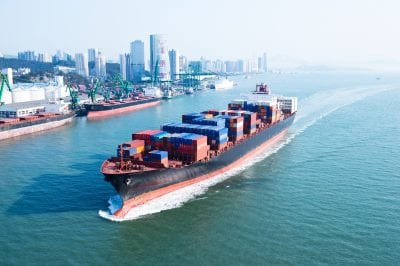What does intermodal mean? Intermodal definition
Intermodal freight transportation is a combination of two or more different shipping modes like a truck, intermodal rail transport, ship, or aircraft to move freight to the final destination. In intermodal logistics and transportation, each carrier is responsible for a particular model. Therefore, there are several freight bills from different carriers when using intermodal shipping.
Shippers who move loads more than 750 miles can add value to the overall supply chain. How? Try using different transportation modes, or intermodal, instead of just OTR. The top 3 reasons for shippers to use intermodal transportation are lower costs, consistent capacity, and quality service.
What are the benefits of intermodal transportation?
Lower Costs
Companies can reduce transportation spend by moving freight in intermodal containers. Using trucks and rail provides major savings on fuel. Trains use much less diesel than trucks. In fact, a train can move one ton of freight nearly 450 miles on one gallon of fuel. Fuel can become a huge expense for long-haul trucking, but trains help ease the impact. Not to mention, companies will also reduce their carbon footprint. Another money-saving feature of intermodal is the ability to ship in containers. Containers do not require individual handling. This reduces the transportation cost because you need to make very little effort to move a shipment from a truck to a train or a ship or any other combination. Containers will fit easily into any mode and are easy to switch, which makes the carrier process more efficient.

Read The Benefits of Intermodal Transport
Consistent Capacity
Intermodal transportation, especially truck and rail, provides reliable capacity. There is less competition to secure freight for intermodal transport, which further lowers cost, but more importantly, offers capacity when and where it’s needed. With the driver shortage and increased shipping activity, intermodal transport is increasingly appealing to shippers. Rather than paying high rates to guarantee capacity, or bending over backwards to accommodate carriers, companies can ship via intermodal any time, at a reasonable price. This is a good way to overcome current problems in the trucking industry where carriers are cranking up prices and slowing down service.
Quality Service
Possibly the biggest benefit of using intermodal transportation is the quality of service. Intermodal is more resourceful than other modes. Shippers have discovered that intermodal transportation is faster than OTR, as intermodal providers are increasing train speed and reduce the time for cars in the yard.
Read Intermodal vs Multimodal Freight
Safety
Intermodal transportation can also be safer and more secure for cargo. Obviously, trains are on a fixed track and are less likely to be in an accident while carrying hazardous or highly combustible freight. This means fewer restrictions on loading, unloading, and carrying dangerous materials, which speeds up the shipping process. When containers drop down into the well on a train, the doors cannot open, and when they’re double-stacked, the top container is 15 feet off the ground, making it difficult to reach. And, cars are spending less time in the yard, which keeps freight moving.
Convenience
Intermodal transportation is convenient, too. Not only is capacity available when it is needed, and shippers find a 10 to 30 percent over trucking, but technological advances in the industry have made shipping intermodal just as efficient and reliable as shipping OTR. Containers now have track and trace capabilities. Shippers no longer have a 3-day span for delivery time and kept in the dark hoping their shipment made it. Visibility into shipment status is the same as shipping OTR, making intermodal service selection easier and mode comparison more accurate.
Intermodal Transportation and Logistics
Intermodal transport is becoming popular very quickly. A number of inefficiencies in OTR shipping are pushing shippers to find other ways to move their products. Intermodal logistics provides a promising alternative.
For more information please visit our Intermodal Transportation page or submit your information to receive a free quote today!

